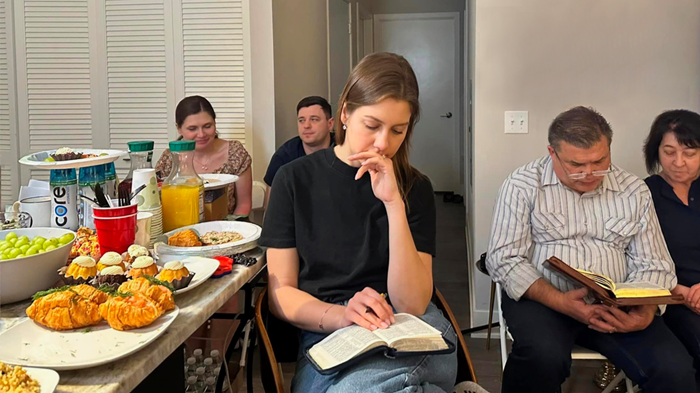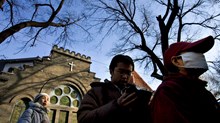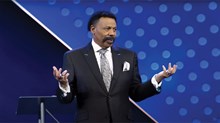
Sergei Karpenko’s Chicago church is now almost entirely made up of refugees from the Russian war against Ukraine.
Many of them aren’t from a church background, so the pastor of Bible Church of Ukraine–Chicago spends his mornings eating breakfast with the new arrivals and evenings hosting Bible studies in his apartment.
“It happens by the providence of God that I am here, and God sent new people from Ukraine,” Karpenko, who is Ukrainian himself, told CT. “I never prepared myself for such a ministry. We’re making mistakes and learning. Pray for us.”
Refugees come to his church by word of mouth or through refugee resettlement agencies like World Relief. Some Telegram channels for new Ukrainian arrivals advise them to find a local church for support. Karpenko’s church—which worships in Ukrainian, Russian, and English—tells freshly arrived Ukrainians that they can contact them if they need help, conversation, or friendship.
The US has welcomed about 300,000 Ukrainians since Russia invaded Ukraine. Millions more are refugees in Europe.
Slavic churches are key to helping the hundreds of thousands of new arrivals to the US. Many of these refugees are coming in through a special program (Uniting for Ukraine) that doesn’t go through the traditional refugee resettlement agencies, instead assigning arrivals to individual sponsors.
But in some cases, sponsors disappeared when Ukrainians arrived. Churches are trying to provide a steadier foundation for the new arrivals. For Ukrainian Christians already living in the US, it’s a helpful way to process the war.
“You can’t cry all the time and sit and watch the news 24/7,” said Chicago pastor Russ Drumi, whose church also has many war refugees. “Kids are growing. There are things to do.”
Ukrainian Christians in the US sponsoring new arrivals have helped with essentials, lent cars, hosted families for a couple of months, cosigned on apartments, helped find jobs, or shared information on various government services. A Ukrainian Assemblies of God church in New York City recently hosted a dinner of borscht and Ukrainian potato pancakes so new arrivals could gather to talk about their experiences in the country.
More than 4 in 10 Ukrainians have family separated by the war, so churches are often helping mothers with young children or other fragmented families.
Evangelicals from the former Soviet Union came to the US in droves after the passage of the Lautenberg Amendment in 1989, which gave asylum to those fleeing religious persecution. Those evangelicals—including current World Relief resettlement staffers—are now the welcome wagon for war refugees.
Churches reported to CT stories of refugees who are becoming new church leaders, and of new congregants who have never been to church or who only celebrated Orthodox Easter and Christmas before arriving in the US.
As a result of all of this, Slavic churches say that war refugees are dramatically growing their congregations. Cornerstone First Ukrainian Assembly of God in Manhattan’s East Village has seen about 30 percent growth from refugees, and one of the new arrivals is now a minister.
As churches expand, they are also wrestling with their cultural identity. While many Ukrainians speak Russian as a first language, some churches have now started Ukrainian language services to preserve the language and culture. Churches with Russian language services are also now seeing Russians arrive seeking asylum in the US and are working through sometimes painful tensions.
Chicago is the No. 2 resettlement area for Ukrainian refugees after New York City, which has the largest population of Ukrainians in the country, according to World Relief. Another resettlement hub is in Sacramento, California.
Tatyana Sigidina, World Relief’s liaison for Ukrainian refugees and Slavic churches in the Chicago area, arrived in the US in 1999 under the Lautenberg Amendment. She still has family in Ukraine, and in Ukrainian territory now occupied by Russia.
Sigidina has noticed many more Russians seeking asylum through the Mexican border, coinciding with a new conscription law requiring Russians to serve in the military. (The law took effect in April.)
Since the beginning of this year, about half of the asylum seekers Sigidina works with have been Russian, half Ukrainian. There isn’t a parole program for Russians like there is for Ukrainians, so pastors say the Russians arrive with less access to public resources.
Slavic churches largely are serving both populations.
“It doesn’t matter from which country, we are Christian, this is No. 1,” said Sigidina. “Of course, it’s hard to say that. If Russia had destroyed your motherland, of course you might not have enough love in your heart.”
Some churches have had problems between Russians and Ukrainians, but not “big problems,” she said. Russians seeking asylum in the US are generally not supportive of the war, she said.
Karpenko, the Ukrainian pastor in Chicago, said that the support for the war from many Russian evangelical churches—or even just their silence—makes relations difficult.
“If some people come from Russia we will accept them as well,” he said. “But there is some emotional problem. I don’t want to paint a pretty picture. Russia attacked Ukraine and killed Ukrainian people. People must emigrate because Russia attacked.”
Hope Seventh-day Adventist Church in Chicago, a 14-year-old congregation, was called Hope Russian Church before the war. Drumi told CT that people in the church didn’t support the war and felt uncomfortable with the name, so the church changed it simply to “Hope.”
But the congregation still has many Russian-speaking members, including Drumi, and both Ukrainian and Russian refugees.
The church’s size doubled with arriving refugees after the war broke out, and a few months ago congregants decided to plant a church. One church now conducts services in the Ukrainian language, and another, which Drumi leads, worships in Russian. Many Ukrainians who speak Russian go to that service, with Russians. The pastor of the Ukrainian congregation is a refugee.
Drumi says the plant wasn’t because of war-torn relationships between Russians and Ukrainians, but to accommodate growth and language needs.
“Sometimes on the personal level it could get tense,” between Russians and Ukrainians, he said. “It’s painful, it’s hard, but still we are Christians. Our homeland is heaven, the kingdom of God.”
The Ukrainian and Russian congregations have done joint worship services together when worship space for two services wasn’t available, and they do fellowship meals. There’s a service at night for young people that includes congregants from the Russian-speaking and Ukrainian-speaking churches. Slavic churches are working through an “identity evolution,” Drumi said.
At Cornerstone Church in New York City, the English-speaking pastor for youth, Paul Oliferchik, stepped aside to have a refugee who was fluent in Ukrainian step in—“a capable, gifted, and godly leader,” he said. The refugee population had grown so much in the church that the church needed a Ukrainian speaking minister, he said.
Most of the refugees at the church are Ukrainian, Oliferchik said, but there are some Russians too who took the risky route through the southern border. One is a family with a toddler.
For those new Ukrainian church leaders arriving, like the pastor at his church, Oliferchik dreams that the scattering of Ukrainian Christians could possibly “re-evangelize the West.”
Karpenko in Chicago also serves a church and seminary in Ukraine; he teaches and preaches over Zoom now. He thinks about his Chicago church made up entirely of refugees like Israel in exile in Babylon.
“God gave them a command to go live and praise the Lord. Certain things we cannot change. What can we do? We just pray,” he said. “Our hope is in Jesus Christ. He knows his sovereign will. He knows why, and what he wants to achieve.”

Support Our Work
Subscribe to CT for less than $4.25/month


















